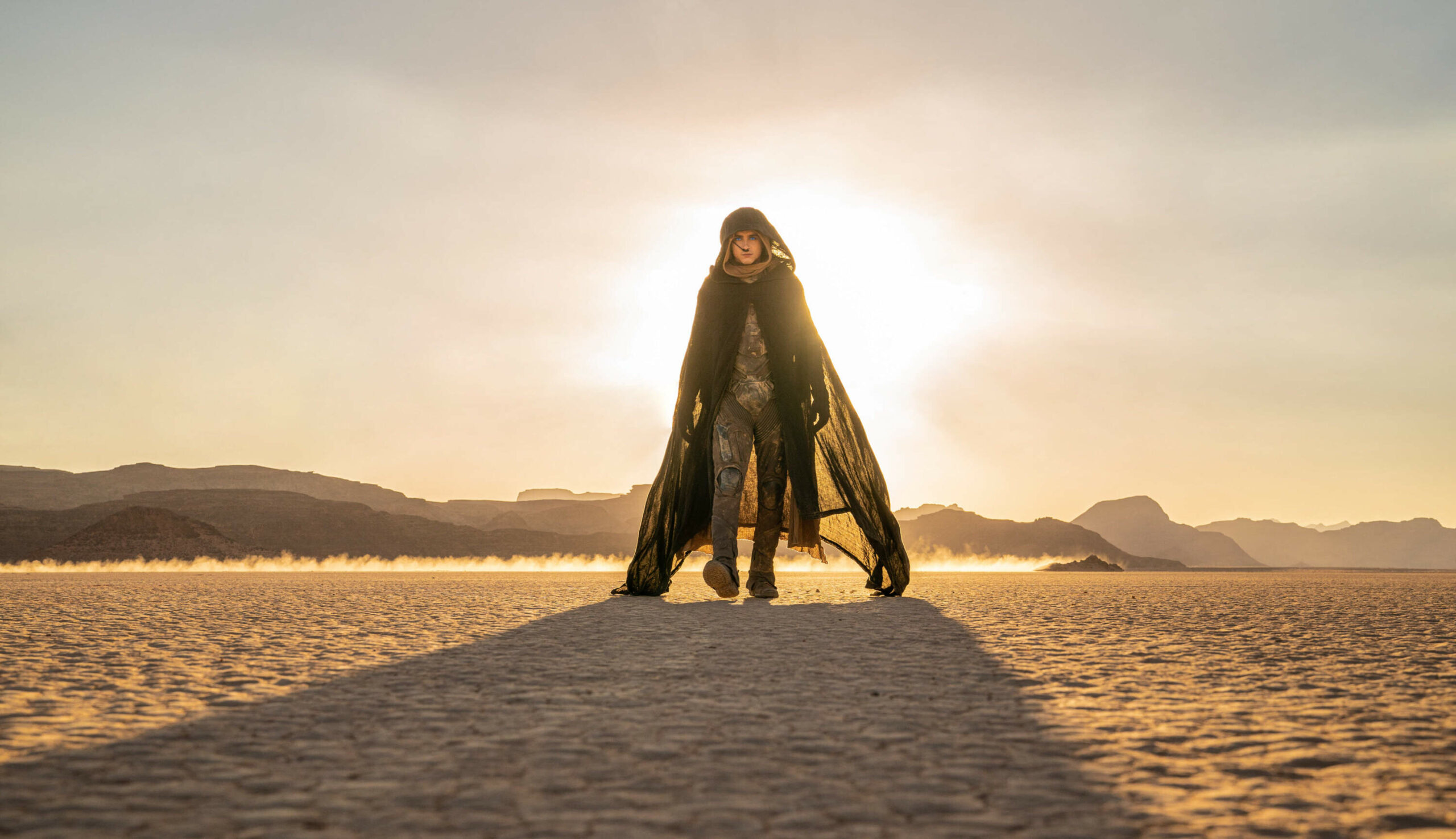
Now this is Dune. Having spent the first three hours in this two-part film world-building, Denis Villeneuve jumps into Dune: Part Two believing that we understand the rules of this world and the aims of the multitude of characters peopling it. The film runs and doesn’t stop, grappling onto novelist Frank Herbert’s narrative and letting all its power and weirdness fright train it away. I enjoyed the first film in this two-film mega movie with all it’s tactility, clear sense of scale, and narrative scope. I adore this second entry. It’s got that thing that great stories have – a life of its own. The storytellers and the audience encounter it together and marvel at its strange, sometimes horrible beauty.
Humanity’s most resilient stories are inherently strange. We keep talking about the Bible and Homer and A Thousand and One Nights and Journey to the West and Shakespeare and Frankenstein and Citizen Kane and Vertigo and The Lord of the Rings and Star Wars and Dune and countless other myths, folklore, and fairy tales because they are always beyond us. They are bigger than us. We don’t fully understand them or their effect on us. It’s like the stories visited their original storytellers, not like they created them, and the stories continue to visit us. Villeneuve and his team of filmmakers don’t “tell” this story. They bear witness to it. Like Fremen on the back of a worm, they ride the story and beckon the audience to do the same.
You don’t have to accept Dune: Part Two like this. You don’t have to allow the visitation. Instead, you can dwell on its more familiar aspects, like the basic “white savior” myth that forms the foundation of the story. You can say you’ve “seen it before” and ask, dismissively, “Why do we have to keep telling this same story?” If that’s the way you want to react to this film, if you want to stand over it in that way, okay, I guess. I think assumed superiority is a hollow feeling.
Rather, you can say “I’ve seen this before” out of recognition that this story is alive in a way that few stories are, that it moves of its own will and reenters our lives every now and again like a titan spanning the landscape in a single stride. You can ask, “Why do we have to keep telling this same story?” like it’s a prayer. You can stand under Dune, look up at it, and let its strangeness work on you, stirring up emotions and thoughts you may not have known you had.
Beneath the urge to dismiss this story is a belief that people choose which stories to tell in an effort to push society in a certain direction – “white savior myths perpetuate white savior beliefs.” That perspective is part of Dune. There are characters who believe powerful people have seeded the planet of Arrakis with a prophecy in order to control the indigenous population. In Dune, they’re not wrong! I don’t think there’s a vast storytelling conspiracy at work in our world, but it is also true that the stories we tell influence the kinds of people we think we can be and the kind of world we think we can create.
But there are other beliefs about the stories we tell at play in Dune too. There are others who know that once the story was release and believed in by the people, it took on a life of its own. No one can control it. Some characters are thrilled to see where the story goes and where it takes them. Others are horrified by the direction the story is heading, ashamed of their part in it, and desperate though unable to get away from it. Others see it headed in a direction they didn’t anticipate, but they still think they can control it. These are all ways we respond to stories too, especially the religious type, like the prophecy in Dune, which place expectations on us. These are all valid responses.
So watching Dune: Part Two, there are two dynamics at work. On the one hand, it’s a rip-roaring yarn, told with gusto and obvious enthusiasm for the material. It’s a big budget, not-afraid-to-be-weird-but-never-so-weird-it’s-off-putting, science-fiction spectacular. Let the movie carry you away. And on the other hand, it’s a provocative story about religious stories and how they shape us and our society. For someone like me who spends all his time thinking about religion and movies and who loves when filmmakers take big swings, Dune: Part Two is so much fun.
The nature and power of stories, and religious stories in particular, is just the primary theme of Dune: Part Two. There’s plenty else to focus on if you’d rather.
Those were just a few of the things that bounced around my mind while I watched Dune: Part Two (twice in two days). It is a fantastic movie. Go see it as many times as you can on the biggest, loudest screen possible.
Now this is Dune. Having spent the first three hours in this two-part film world-building, Denis Villeneuve jumps into Dune: Part Two believing that we understand the rules of this world and the aims of the multitude of characters peopling it. The film runs and doesn’t stop, grappling onto novelist Frank Herbert’s narrative and letting all its power and weirdness fright train it away. I enjoyed the first film in this two-film mega movie with all it’s tactility, clear sense of scale, and narrative scope. I adore this second entry. It’s got that thing that great stories have – a life of its own. The storytellers and the audience encounter it together and marvel at its strange, sometimes horrible beauty.
Humanity’s most resilient stories are inherently strange. We keep talking about the Bible and Homer and A Thousand and One Nights and Journey to the West and Shakespeare and Frankenstein and Citizen Kane and Vertigo and The Lord of the Rings and Star Wars and Dune and countless other myths, folklore, and fairy tales because they are always beyond us. They are bigger than us. We don’t fully understand them or their effect on us. It’s like the stories visited their original storytellers, not like they created them, and the stories continue to visit us. Villeneuve and his team of filmmakers don’t “tell” this story. They bear witness to it. Like Fremen on the back of a worm, they ride the story and beckon the audience to do the same.
You don’t have to accept Dune: Part Two like this. You don’t have to allow the visitation. Instead, you can dwell on its more familiar aspects, like the basic “white savior” myth that forms the foundation of the story. You can say you’ve “seen it before” and ask, dismissively, “Why do we have to keep telling this same story?” If that’s the way you want to react to this film, if you want to stand over it in that way, okay, I guess. I think assumed superiority is a hollow feeling.
Rather, you can say “I’ve seen this before” out of recognition that this story is alive in a way that few stories are, that it moves of its own will and reenters our lives every now and again like a titan spanning the landscape in a single stride. You can ask, “Why do we have to keep telling this same story?” like it’s a prayer. You can stand under Dune, look up at it, and let its strangeness work on you, stirring up emotions and thoughts you may not have known you had.
Beneath the urge to dismiss this story is a belief that people choose which stories to tell in an effort to push society in a certain direction – “white savior myths perpetuate white savior beliefs.” That perspective is part of Dune. There are characters who believe powerful people have seeded the planet of Arrakis with a prophecy in order to control the indigenous population. In Dune, they’re not wrong! I don’t think there’s a vast storytelling conspiracy at work in our world, but it is also true that the stories we tell influence the kinds of people we think we can be and the kind of world we think we can create.
But there are other beliefs about the stories we tell at play in Dune too. There are others who know that once the story was release and believed in by the people, it took on a life of its own. No one can control it. Some characters are thrilled to see where the story goes and where it takes them. Others are horrified by the direction the story is heading, ashamed of their part in it, and desperate though unable to get away from it. Others see it headed in a direction they didn’t anticipate, but they still think they can control it. These are all ways we respond to stories too, especially the religious type, like the prophecy in Dune, which place expectations on us. These are all valid responses.
So watching Dune: Part Two, there are two dynamics at work. On the one hand, it’s a rip-roaring yarn, told with gusto and obvious enthusiasm for the material. It’s a big budget, not-afraid-to-be-weird-but-never-so-weird-it’s-off-putting, science-fiction spectacular. Let the movie carry you away. And on the other hand, it’s a provocative story about religious stories and how they shape us and our society. For someone like me who spends all his time thinking about religion and movies and who loves when filmmakers take big swings, Dune: Part Two is so much fun.
The nature and power of stories, and religious stories in particular, is just the primary theme of Dune: Part Two. There’s plenty else to focus on if you’d rather.
Those were just a few of the things that bounced around my mind while I watched Dune: Part Two (twice in two days). It is a fantastic movie. Go see it as many times as you can on the biggest, loudest screen possible.

Elijah Davidson is Co-Director of Brehm Film and Senior Film Critic. Subscribe to Come & See, his weekly newsletter that guides you through the greatest films ever made, and find more of his work at elijahdavidson.com.
Dune: Part One is an inherently ecological tale. It’s about the preeminence of the natural world in the workings of our governments, economies, and religions.